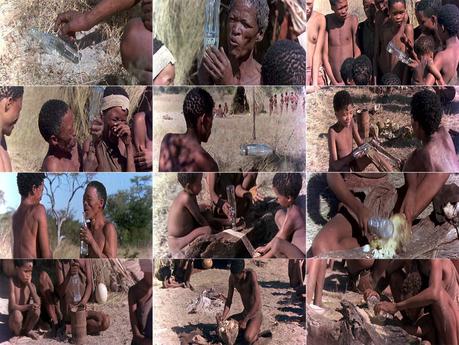The landing of a strange, unique and unnatural object in a hunter-gatherer society with no sense of ownership is the starting point of the narration in the movie fragment above.
The Bushmen living in the Kalahari desert have to deal with a new tool: at first considered “the most useful thing the gods had ever given them; a real labour-saving device”, but suddenly turning into an “evil thing”, a Coca-Cola bottle is a true main character in The Gods Must Be Crazy.

There is a cinematographical—and discursive—reference when Xi throws the bottle to the air, trying to return it to the gods. The scene has a resemblance to 2001: A Space Odyssey. As the bone in Kubrick’s movie, the bottle serves as a tool, but it also has a destructive power in it—not only physical, but regarding the relationships betweeen members o f the same society—. In Robert Castle’s words, “in Jamie Uys’ story, the !Kung preserve their innocence by casting the bottle out of their paradise. This becomes only way to evade the technological trap. In Kubrick’s film, once man took the first step into this trap—made the first steps on the technological trip—there was no turning back. There’s no border between the bone as tool and weapon.”
Before wanting to get rid of the bottle, there is an interesting sequence of different functions the Bushmen can accomplish thanks to this new object. But would these have been the same if this people, who are supposed to be unaware of the “civilized” society, weren’t being filmed? Although narrated with a documentary language, as Todd Alcott points out, “the falsehood of the movie’s premise is right there on the screen; the Bushmen of the movie are flabbergasted by the sight of a Coke bottle, but not of a film crew, recording their fictional actions“. A “behind-the-scenes” documentary could be really interesting, but a hidden cam in the same scenario would be even more revealing.

Humans avoid the Kalahari like the plague because man must have water to live. So the beautiful landscapes are devoid of people. Except for the little people of the Kalahari. Pretty, dainty, small and graceful, the Bushmen.
[...]
They believe that the gods put only good and useful things on the earth for them to use. In this world of theirs, nothing is bad or evil. [...] These Bushmen have never seen a stone or a rock in their lives. The hardest things they know are wood and bone. They live in a gentle world, where nothing is as hard as rock, steel or concrete.
[...]
In the deep Kalahari, there are Bushmen who have never seen or heard of civilized man. Sometimes they hear a thundering sound when there are no clouds in the sky, and they assume the gods have eaten too much and their tummies are rumbling. Sometimes they can even see the evidence of the gods’ flatulence.
[...]
Lately, strange new things sometimes appeared in the sky. Noisy birds that flew without flapping their wings. One day, something fell from the sky. Xi had never seen anything like this in his life.
It looked like water, but it was harder than anything else in the world. He wondered why the gods had sent this thing down to the earth. It was the strangest and most beautiful thing they had ever seen. They wondered why the gods had sent it to them. Pabo got his finger stuck in the thing and the children thought he was very funny. Xi tried the thing out to cure thongs. It had the right shape and weight. It was also beautifully smooth and ideal for curing snakeskin. And Pabo discovered you could make music on it. And every day they discovered a new use for the thing. It was harder and heavier and smoother than anything they’d ever known. It was the most useful thing the gods had ever given them. A real labour-saving device.
But the gods had been careless. They had sent only one. Now, for the first time in their lives, there was a thing that could not be shared, because there was only one of it.
Suddenly, everybody needed it most of the time. A thing they had never needed before became a necessity. And unfamiliar emotions began to stir. A feeling of wanting to own, of not wanting to share. Other new things came. Anger, jealousy, hate and violence. Xi was angry with the gods. He shouted, “Take back your thing! We don’t want it! Look at the trouble it brought!”
But the gods did not take it back. He shouted, “You must be crazy to send us this thing! Take it back!” Then he shouted, “Look out! Look out!” But he spoke too late and the thing felled his daughter Dani. Xi carried the thing away from the shelter and buried it. That evening, there was no laughter and no chatter around the family fire. A strange feeling of shame had come over the family, and they were very quiet. Xi said, “I have buried the thing. It will not make us unhappy again.”
[...]
That night the family was very unhappy. They began to talk about this thing coming to their lives. They did not have a name for it. They called it the “evil thing”. Gabo said, “Perhaps the gods were absent-minded when they dropped the evil thing on the earth. They’ve always sent only good things, like rain, trees, roots and berries to eat. We are their children and they love us. But now they’ve sent this evil thing.” Xi said, “The thing does not belong on the earth. Tomorrow I will take it to the end of the earth and throw it off.”
[...]
Only 600 miles to the south, there’s a vast city. And here you find civilized man. Civilized man refused to adapt himself to his environment. Instead he adapted his environment to suit him.
So he built cities, roads, vehicles, machinery. And he put up power lines to run his labour-saving devices. But somehow he didn’t know when to stop. The more he improved his surroundings to make his life easier, the more complicated he made it. Now his children are sentenced to 10, to 15 years of school, just to learn how to survive in this complex and hazardous habitat they were born into. And civilized man, who refused to adapt himself to his natural surroundings now finds he has to adapt and re-adapt every day and every hour of the day to his self-created environment.
Thanks to Marc Ligos for the tip.

